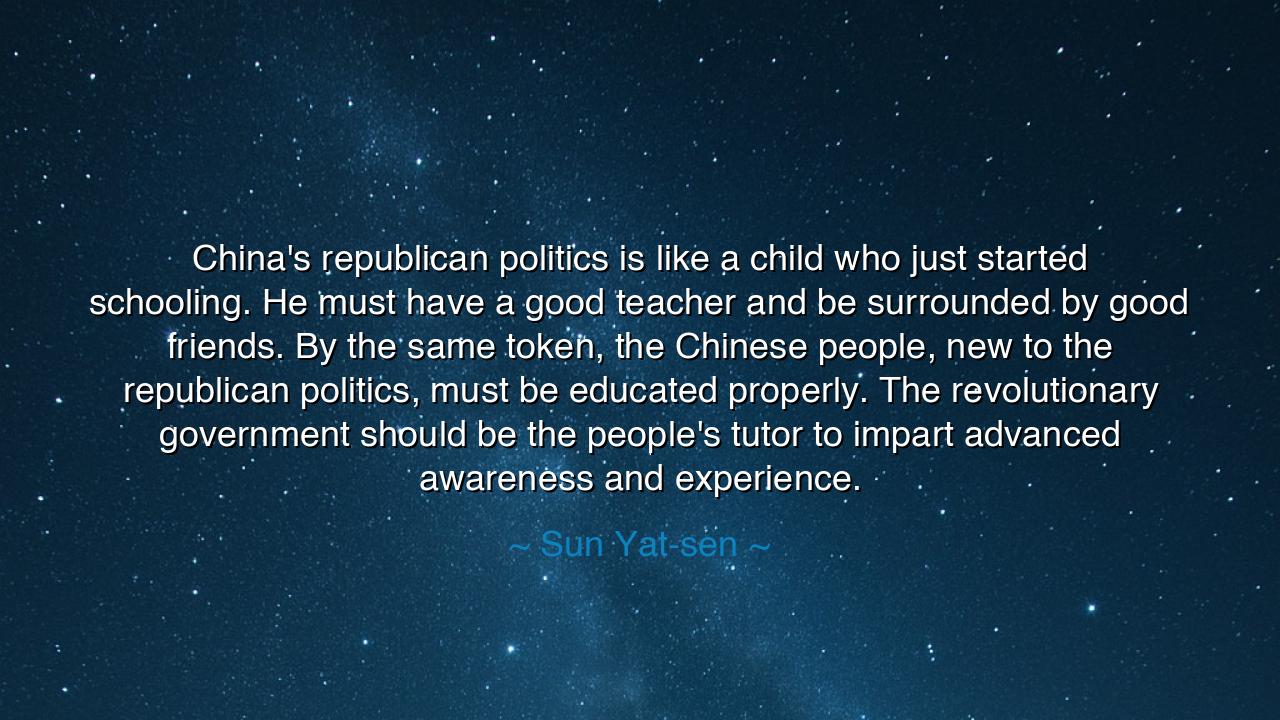
China's republican politics is like a child who just started
China's republican politics is like a child who just started schooling. He must have a good teacher and be surrounded by good friends. By the same token, the Chinese people, new to the republican politics, must be educated properly. The revolutionary government should be the people's tutor to impart advanced awareness and experience.






Sun Yat-sen, the father of modern China, once declared with clarity and foresight: “China's republican politics is like a child who just started schooling. He must have a good teacher and be surrounded by good friends. By the same token, the Chinese people, new to republican politics, must be educated properly. The revolutionary government should be the people's tutor to impart advanced awareness and experience.” In these words, he revealed the fragile beginnings of a new era, comparing the rebirth of a nation to the growth of a child: innocent, hopeful, but vulnerable, in need of guidance and cultivation.
The origin of this statement lies in the great transformation of China at the dawn of the 20th century. The Qing dynasty had fallen, and the dream of a republic was born. But Sun, with wisdom, understood that to declare a republic was one thing, and to practice it another. For a people long accustomed to emperors and dynasties, republican politics was no natural inheritance; it was a new discipline, a new language, a new way of living together. Thus, like a child in his first days at school, the nation required not only freedom but also structure, guidance, and learning.
History confirms this truth again and again. When the French Revolution swept away monarchy, the people rejoiced in liberty, but lacking experienced teachers in democracy, they fell into chaos, into the guillotine, into the reign of terror, and finally back into empire. Their child was left untutored, and so it stumbled. In contrast, the American republic, though flawed, was nurtured by leaders like Washington, Madison, and Jefferson — men who understood themselves as guardians and tutors of a people still learning self-rule. Sun Yat-sen saw these lessons, and he wished for China not to repeat the same tragedies.
The heart of his metaphor lies in the relationship between the teacher and the student. A child cannot grow well without wise instruction, nor can a people practice liberty without first being shown its duties and responsibilities. Friends too are essential: for just as a student is shaped by his companions, so a young nation is shaped by its allies. To Sun, the revolutionary government was not to be a tyrant, nor a distant ruler, but a patient tutor — one who walks beside the people, guiding them in civic virtue, teaching them to balance rights with responsibilities, and preparing them to stand as equals in the family of nations.
There is also a deeper wisdom here about time. A child does not become a sage overnight, and a republic does not become strong in a single generation. There must be patience, perseverance, and steady instruction. Sun Yat-sen knew that failure to educate the people would lead only to instability, faction, and corruption. But if the people were properly guided, if they were trained in civic awareness, then the republic would grow sturdy like an oak, able to endure the storms of history.
The lesson for us is clear: freedom without guidance is fragile, like a blade of grass in the wind. Every new beginning — whether of a nation, a community, or even an individual life — requires mentors, teachers, and companions. If you are in a position of leadership, see yourself not as a master, but as a tutor, entrusted to raise those under your care into maturity. And if you are learning, do not resist instruction, for it is the pathway by which strength is gained.
What must we do, then? First, cultivate patience with new beginnings, whether in politics or in personal life. Second, value the role of wise guidance — seek out teachers and friends who elevate, not corrupt. Third, if entrusted with responsibility, remember Sun Yat-sen’s vision: to lead is to educate, to guide, to lift others into greater strength. In this way, the child grows into a man, and the nation grows into a republic that can stand firm.
Thus, let Sun Yat-sen’s words echo like a call to vigilance: “The revolutionary government should be the people’s tutor.” For in every age, the fate of freedom depends not only on the fire of revolution, but on the slow, steady labor of education. And just as a child, once taught, becomes wise and strong, so too does a people, once guided, become capable of guarding their liberty with honor and with courage.






AAdministratorAdministrator
Welcome, honored guests. Please leave a comment, we will respond soon